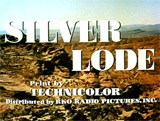
|
Silver Lode (1954)
In director Allan Dwan's and RKO's taut and suspenseful,
Technicolored psychological low-budget western - a 'guilt-by-suspicion'
allegorical film masking as a succinct and timely criticism of the
Cold War's McCarthy era (and very close in theme and plot to High
Noon (1952)):
- the western's setting was during a July 4th
celebration in the frontier town of Silver Lode in Nevada; the
film's action occurred over the course of a day - mostly in 'real-time'
- ominously, four men on horseback
arrived from the town of Discovery, California; the
foursome group of law officials was led by accusatory and vengeful
'Marshal' Fred McCarty (Dan Duryea) (the name was a clear reference
to Sen. Joseph McCarthy); his three deputies were Johnson (Harry
Carey Jr.), Kirk (Alan Hale Jr.) and Wicker (Stuart Whitman); they
briefly asked for information from glamorous Taggert's Saloon Dancer-Singer
Dolly (Dolores Moran) in a bright purple dress
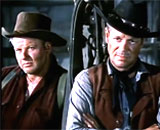
(l to r): Kirk and McCarty
|
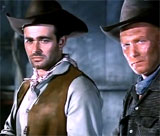
(l to r): Wicker and Johnson
|
- in front of the church with Sheriff Wooley (Emile
Meyer), US Marshal McCarty explained he was there with an arrest warrant
for respected, wealthy rancher/citizen and town sheriff Dan Ballard
(John Payne) (a reformed, ex-gunslinger from two years earlier) who
was in the middle of preparations for a marriage ceremony in the
church to his pretty fiancee Rose Evans (Lizabeth Scott), the daughter
of wealthy Zachary Evans (Morris Ankrum)
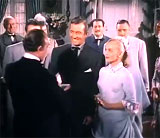
|
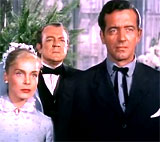
|
|
Interruption of Dan Ballard's (John Payne) Wedding
to Rose Evans (Lizabeth Scott)
|
- the four burst in and stopped the proceedings; the
zealous McCarty claimed they were on a manhunt with a warrant to
arrest Ballard for the crimes of murder and theft committed two years
earlier - the robbery of $20,000 from McCarty's brother by Ballard
who cheated during a poker game, and then the brother was murdered
(with a bullet in the back); Ballard who knew of McCarty and his
brother (both rustlers and outlaws from the past) called him a liar
and the charges false; McCarty demanded that Ballard be extradited
and accompany them to California where the murder occurred (but as
it was later noted, "an accident on the trail might defeat justice")
- the wrongly-accused Ballard decided
to hold off on the wedding; McCarty asserted
that he was seeking the Old Testament style of justice for Ballard
- without due process: ("An eye for an eye, a tooth for a tooth");
to appear reasonable, peaceful, and law-abiding, Ballard refused
the offer of a gun from his brother-in-law to-be Michael "Mitch" Evans
(John Hudson), telling him: "When you kill one man, it's not
so hard to kill the second. The third one's easy"
- members of the wedding party proceeded back through
town, as some of the fickle townsfolk commented on Ballard's guilt
or innocence - could they be loyal to him or not?; a posse was formed
by the Sheriff to safety escort the group back to California, but
McCarty seemed uninterested; in the stable as his horse was prepared,
Ballard confessed to Rose that the brother's murder was in
self-defense: "I did kill his brother" - but not in the back; circumstantially,
the local banker admitted that Ballard had $20,000 when he arrived
in town two years earlier
- in front of the town's Judge Cranston (Robert Warwick), McCarty's extradition request
was upheld; however, the judge allowed Ballard two hours to delay
(or stall) the proceedings to track down evidence to clear his
name and prove his innocence
- in the telegraph
office, the telegrapher Paul Herbert (Frank Sully) was pressured
by Ballard to send the same message to two Sheriffs in Discovery,
and a third to the US Marshal in San Francisco, to receive verifications
to confirm McCarty's identity and warrant; however, the transmissions
failed - the lines appeared to be down (Ballard immediately suspected
that the wires had been deliberately cut by McCarty); Herbert
went to investigate the situation
- another tactic by Ballard was to see if any of McCarty's
'deputies' could be bribed (or bought) to reveal the truth and turn
on McCarty and expose him; Rose's rich father Zach offered $5,000
cash to pay off Johnson who agreed to be bribed by testifying that
McCarty's credentials and warrant were forged; in the town's livery
stable-barn, Johnson admitted that McCarty had cut the telegraph
wires and also possessed forged Marshal paper credentials and then
killed the forger named Williams; listening from the upper stable
loft, McCarty heard Ballard claim that "Johnson talked," shot
Johnson dead, and then blamed Ballard for the murder: "Ballard
just shot Johnson!"
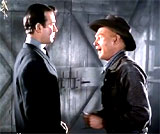
In Livery Stable, Ballard Bribing 'Deputy' Johnson with $5,000 to
Expose McCarty as a Murderous Fraud
|
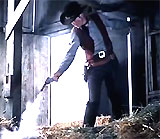
McCarty in Stable Loft Shooting Down Johnson
|
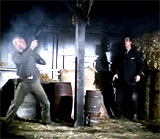
Johnson Shot and Killed by McCarty
|
- McCarty then held Ballard at gunpoint, and bargained
for a payoff: ("I want the money!"); he demanded the $20,000
dollars that Ballard had squarely won from his brother during a poker
game; Sheriff Wooley, who overheard McCarty's incriminating conversation from the
loft, was shot dead but was able to wound McCarty; McCarty blamed
both murders (Johnson and the Sheriff) on the guilty-looking Ballard,
who was seen holding guns in both hands
- Ballard vainly argued for his innocence: "Why should
I kill the Sheriff? He was my friend. Look, I've lived with you people.
I've dealt fairly with you. Isn't my word good for anything?"; the
only stalwart townsperson who ended up believing that Ballard was
innocent and was being persecuted was his virginal, respectable wife
Rose, who argued back: "You're all a pack of cowardly hypocrites.
Dan Ballard's never hurt any of you. And some of you owe him a lot
of gratitude. Are you going to take McCarty's word against his?",
but no one was convinced
- when pressured to surrender, Ballard was forced to
escape and flee on horseback and defend himself, and he killed the
other two 'deputies' (Kirk and Wicker) and slightly wounded Rose's
brother "Mitch" Evans; he was briefly allowed to hide
in the upstairs saloon room of his brazen, jealous ex-mistress Dolly
- the only other person in town (other than Rose) to believe him;
she promised to be with him after Rose would predictably reject him: "Stay
here till it's dark. I'll take good care of ya honey, you'll be OK!";
he refused her offer of escaping from town together, and was determined
to stay and defend his reputation
- when pursued by McCarty and other deputized townsmen during a house-to-house search, the
very desperate and wounded Ballard - filmed with a series
of masterfully-choreographed tracking shots - was followed as he ran
across town from the Evans' home and down Main Street (ironically through
4th of July "Independence Day" decorations); he took cover behind various objects, including
the town's cannon and a well before approaching the locked telegraph
office; he used Judge Cranston as a shield, then hid himself
in a moving stagecoach, dove under a picnic table, then ran
along the church's white picket fence before racing inside; there
he found sanctuary granted by the town's Reverend Field (Hugh Sanders)
- meanwhile in the telegraph office, Ballard's bride-to-be
Rose and Dolly (who had joined forces) pressured Herbert to forge
a phony telegram return-response showing that McCarty's credentials
had been falsified; Rose raced with the manufactured telegram to
Judge Cranston at the church, who read it outloud to all the townsfolk:
("McCarty not what he represents himself to be. Wanted for murder and cattle
rustling. Dan Ballard innocent of charge") - the news exonerated
Ballard and proclaimed his innocence
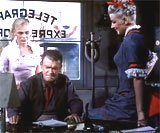
|
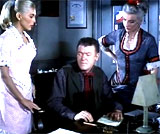
|
|
Telegraph Office Scene
- Rose and Dolly Ordering Paul Herbert to Forge a Phony Telegram Return-Response
|
- simultaneously, there was a climactic confrontational
showdown scene high up in the church bell-tower - where the cornered,
defenseless, unarmed and wounded Ballard was symbolically hiding on
one side of the 'liberty' bell in the belfry, while evil, gun-shooting
antagonist McCarty was firing at him from the other side; miraculously
Ballard was saved -- literally, when McCarty's own bullet ricocheted off the giant
swinging church bell, and he was struck in the heart by his own deflected
bullet; the Reverend called it "an act of God"
|
Deadly Showdown Between McCarty and Ballard in Church's Bell Tower
|
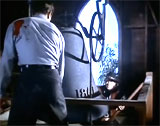
Ballard Face-to-Face with McCarty
|
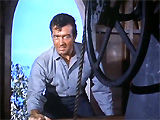
Ballard Wounded, Cornered, and Defenseless
|
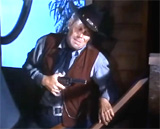
McCarty Hit By His Own Ricocheted Bullet
|
- in the concluding sequence - the reprieved and saved
Ballard descended from the church bell-tower and angrily scorned the
townsfolk who only retroactively apologized: "You're
sorry. A moment ago you wanted to kill me, and you forced me to kill,
to defend myself, to save my own life. You wouldn't believe me. You
wouldn't believe what I said. A man's life can hang in the balance
on a piece of paper. And you're sorry!"
- in the film's epilogue, Ballard's name and reputation
were cleared and it was confirmed that he was innocent all along
and had been telling the truth; the receipt of a real telegram from
Sheriff Harper in Discovery, CA completely and truly exonerated him:
("Fred McCarty wanted. Murder and Rustling. US Marshal on way to Silver
Lode"); Dolly exclaimed "Hallelujah!"
and ran from the office with the news - seen in a stationary shot through
the Telegraph Office's window as she raced far into the distance down
Main Street
|
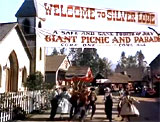
4th of July in Silver Lode
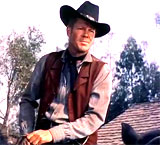
Arrival of 3 Deputies Led by Marshal Fred McCarty (Dan Duryea)
- to Arrest Ballard

Taggert's Saloon Dancer-Singer Dolly (Dolores Moran)

Ballard to Mitch: "When you kill one man, it's not so hard
to kill the second. The third one's easy"
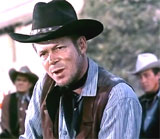
McCarty About Ballard: "He's nothin' but a murderer"
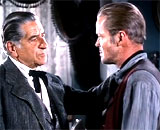
McCarty with Judge Cranston (Robert Warwick) - Extradition Request
Upheld
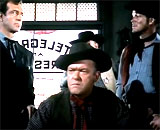
Telegraph Office: Wires Were Discovered to be Cut
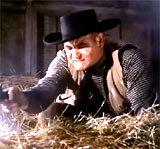
The Sheriff Shot and Killed by McCarty
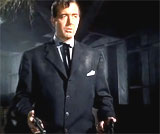
The Murders of Johnson and
the Sheriff Were Blamed on Ballard - Seen With a Gun in Each Hand
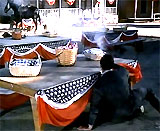
Ballard Pursued in Town
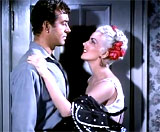
Dolly's Offer to Ballard to Be With Him After He Would Probably Be
Rejected by Rose
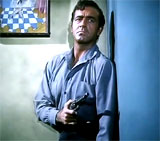
Ballard on the Run
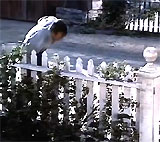
Ballard's Race Down Main Street to Church

Ballard's Final Scornful Words for the Unfaithful
Townsfolk: "A man's life can hang in the balance on
a piece of paper"
|















